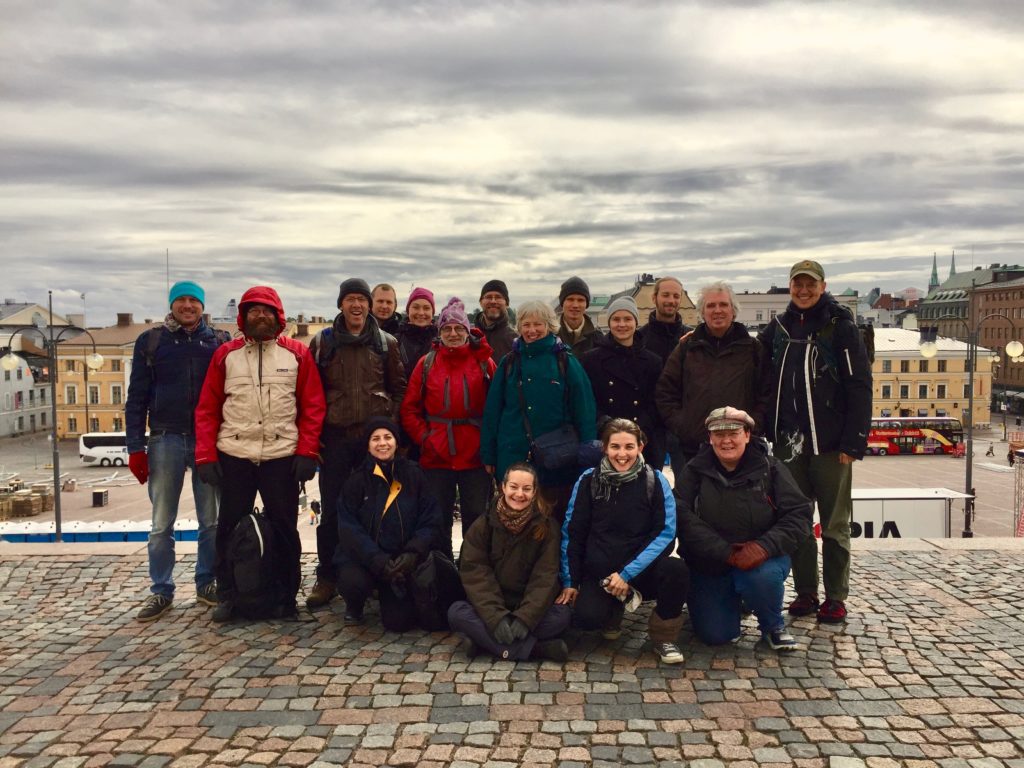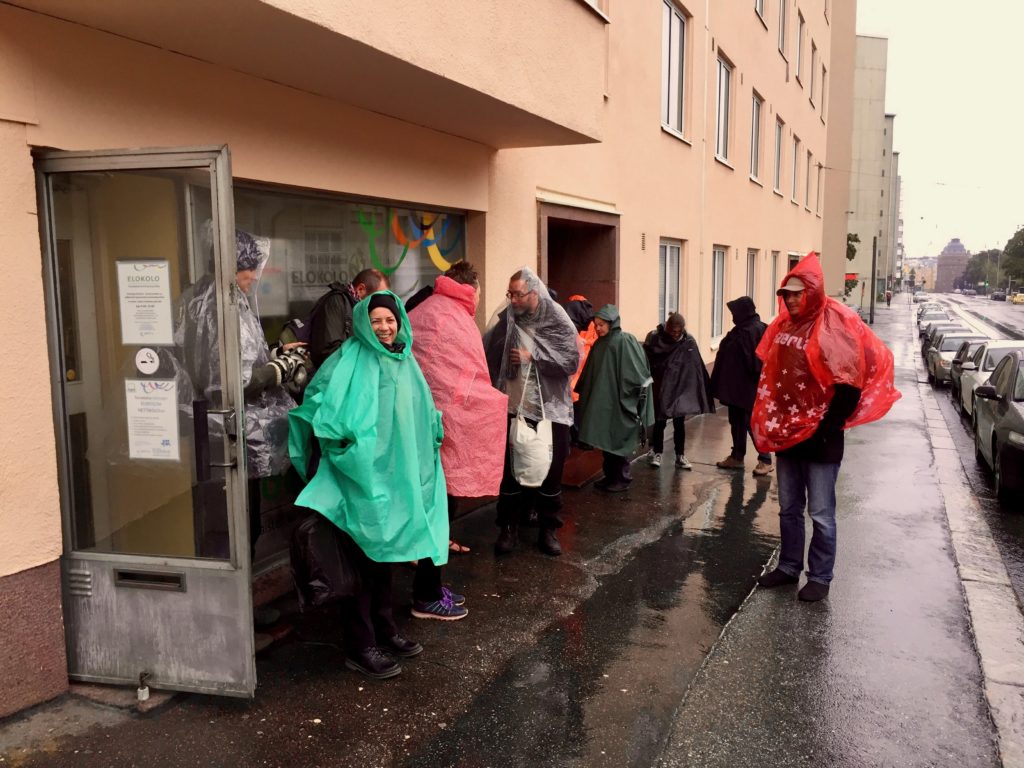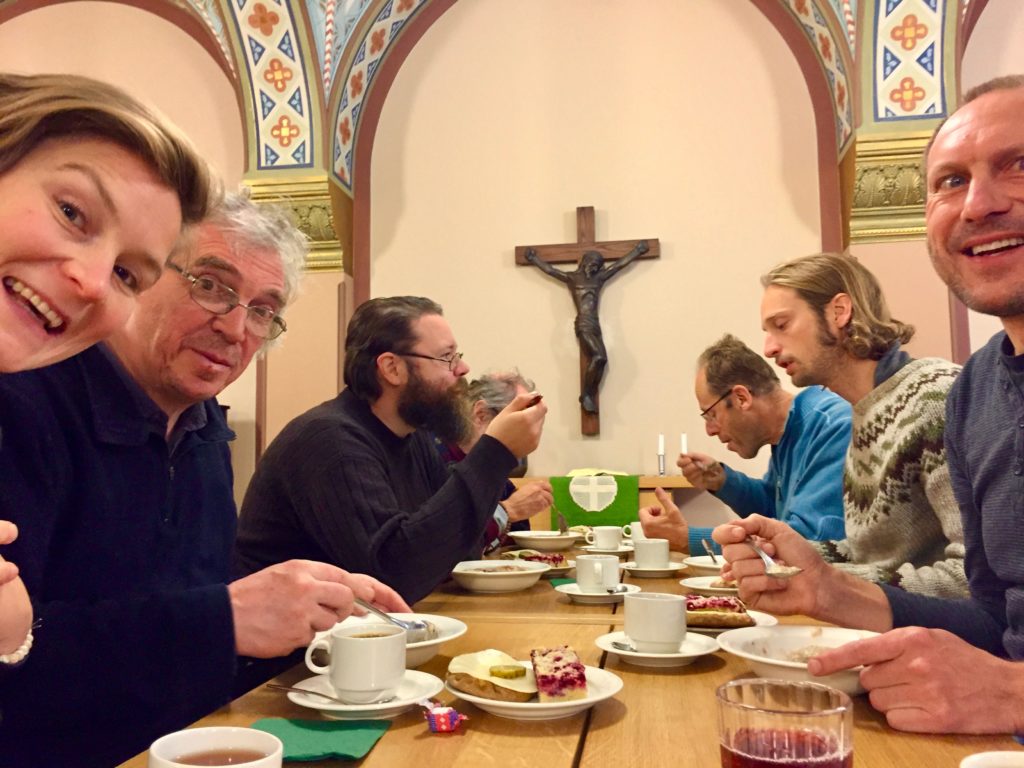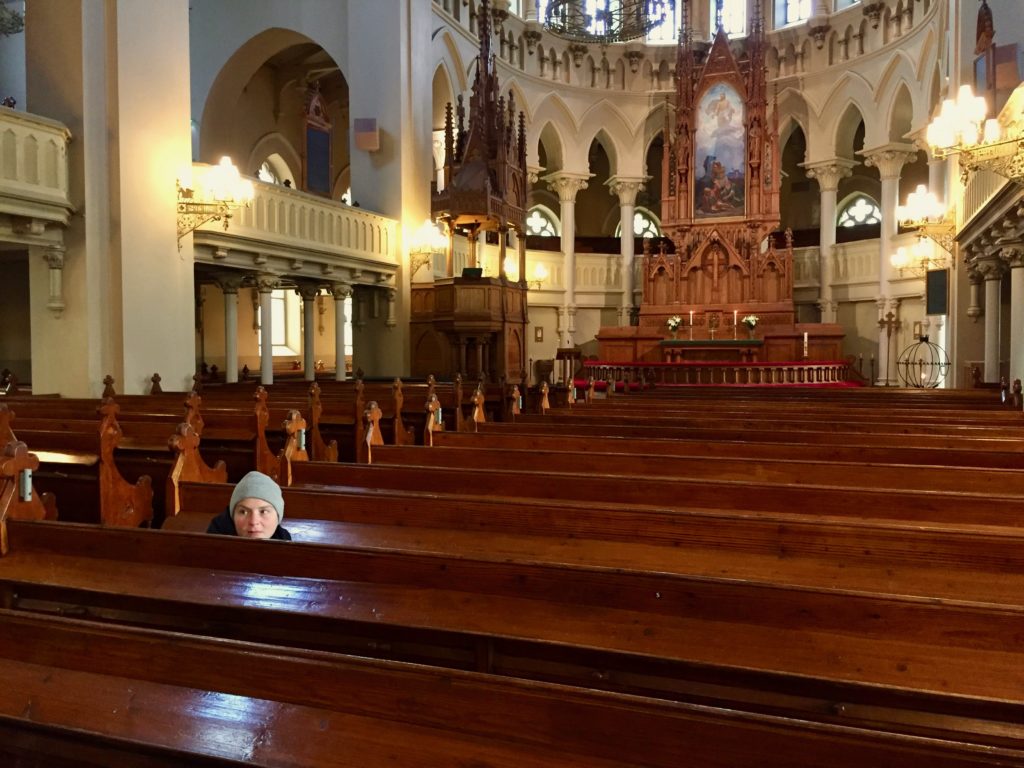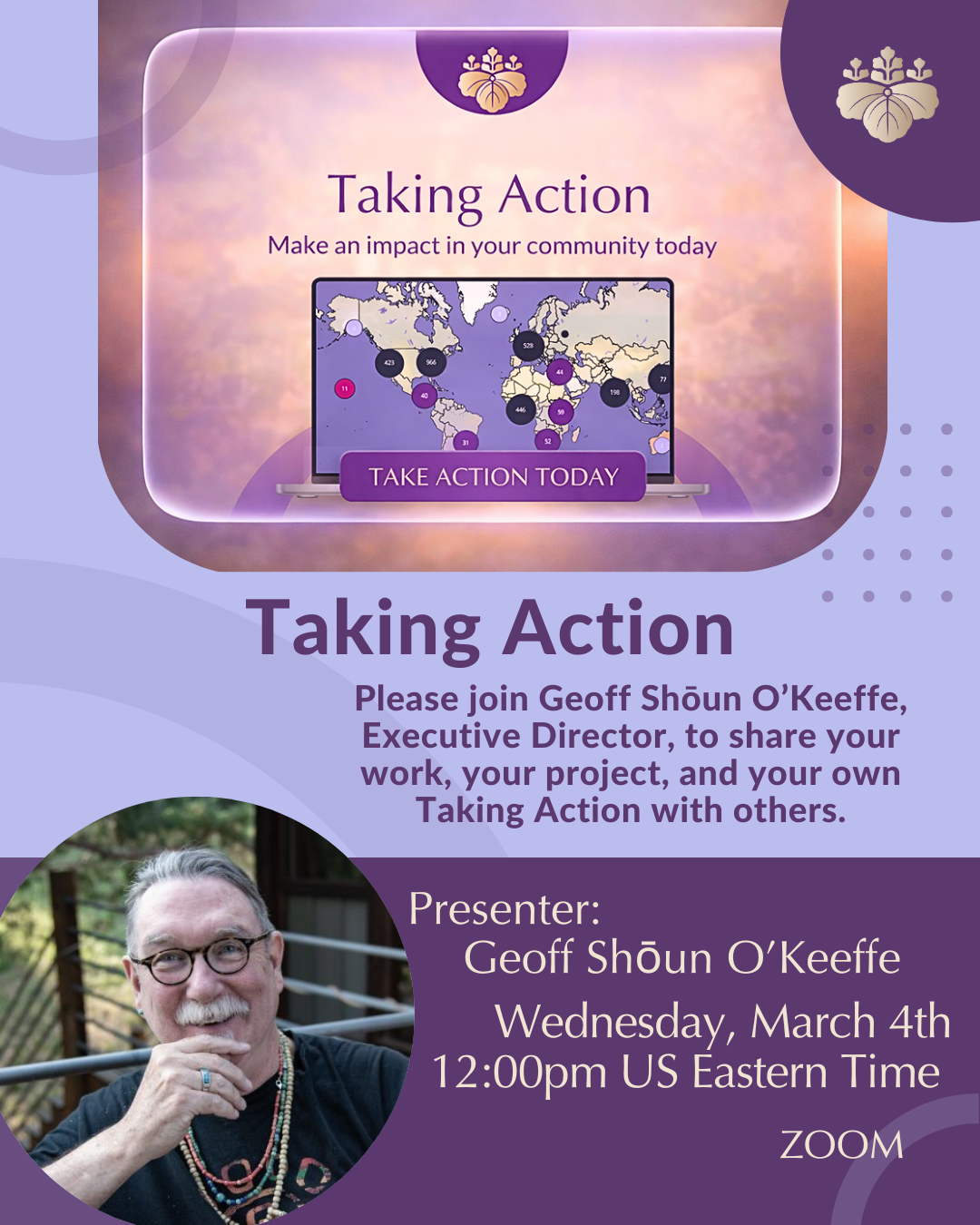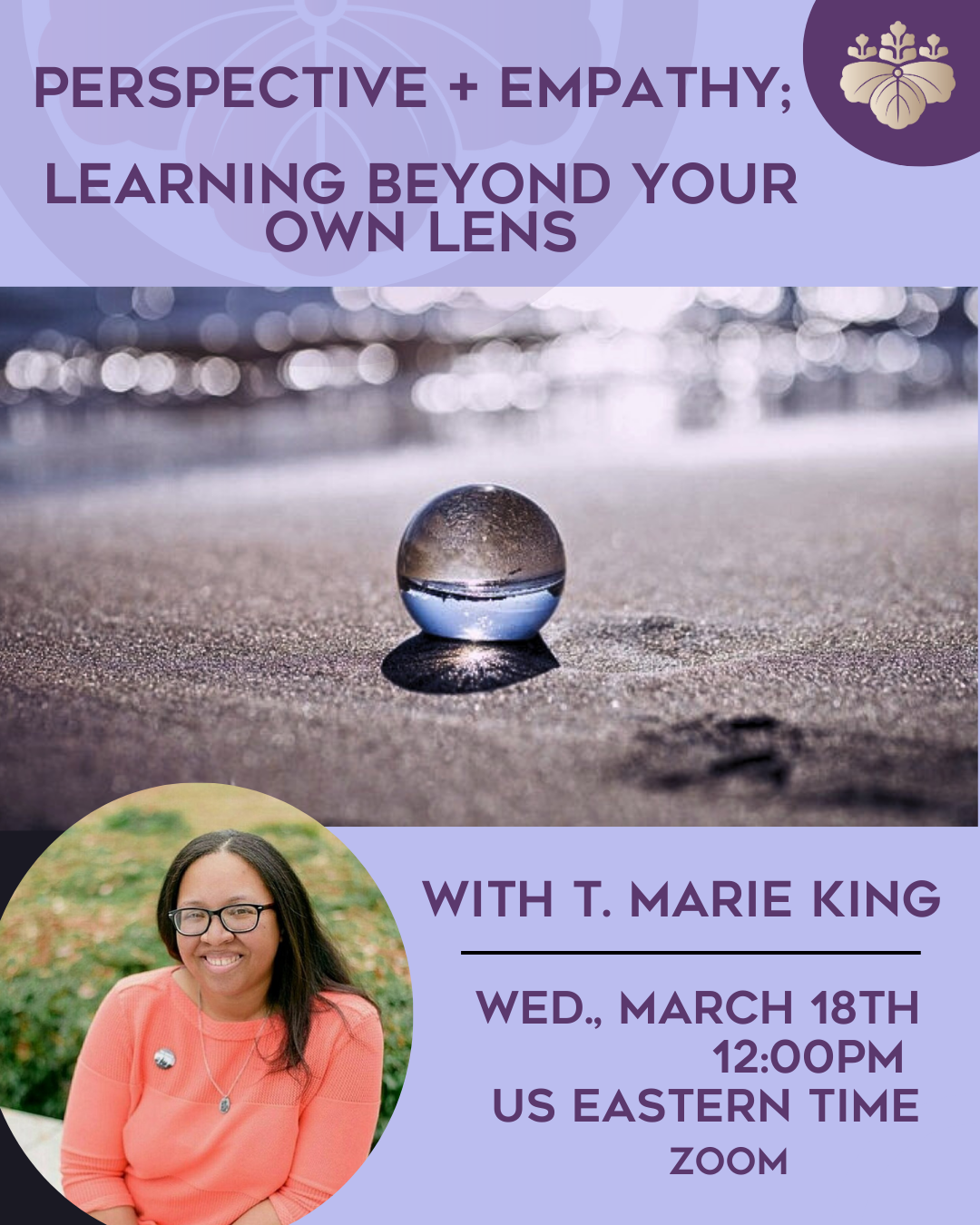In 2017 Zen Peacemaker Mikko Ijäs contacted Roshi Frank DeWaele, asking him to lead the first Street Retreat in Helsinki, Finland. For four days they were immersed in the Zen Peacemakers’ Three Tenets: Not Knowing, Bearing Witness, and Taking Action; they begged for food and money, slept where they could, and left their ordinary routines. Read Mikko’s personal report below.
Opening
HELSINKI, FINLAND. We began our retreat by taking everyone’s luggage and valuables to our place for safekeeping. My wife’s parents were taking care of our boy since my wife Maija was also participating in the retreat. After stripping down our group of the chains of our everyday valuables, we were free.
We walked down to the nearest park to have an opening Council, after which we walked to the Salvation Army to pick some free bread for our next meal. Then we had our first meal next to the the library. We took half an hour to beg for coffee and tea– this was something I had feared for. I was sure it would all end right here. I walked to the nearest bar with three other participants and asked if they would give us four coffees as we didn’t have any money. The bartender said that he had no coffee but he could give us some tea. That felt so nice. He didn’t even ask any questions, he just gave us the tea. I was relieved.
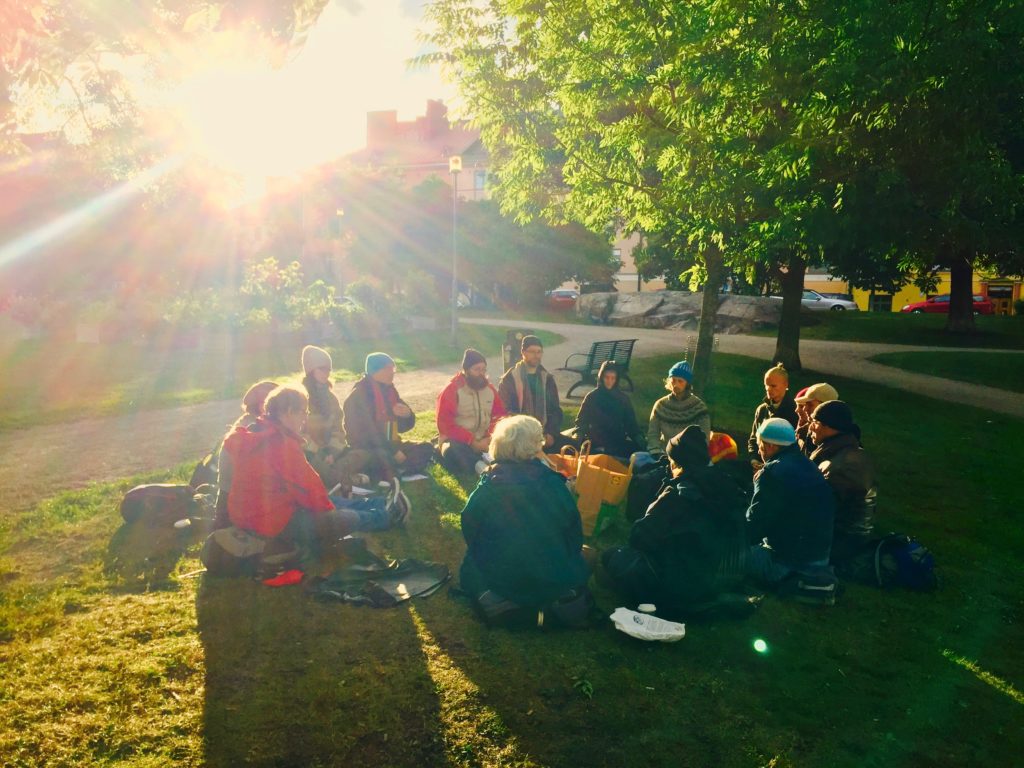
After a nice hot cup of tea we all walked down to Kurvi, which is kind of a center of this working class neighborhood. It had a very busy intersection of three major roads, lots of shops, tram and bus stops and a metro station. There’s a whole variety of life there. Plenty of people passing by. Romanian beggars, alcoholics, junkies and also some homeless folks. It was very cold. Not much more than 13 degrees Celsius (55F), and it was windy. One of our participants hadn’t enough clothes on and we stopped by the local flea market to look for a winter beanie for him. We found one, but we didn’t have the money to buy it. We walked outside and asked a nice young man passing us if he would be willing to help us. He was happy to and we got our hat.
From Kurvi we walked to the nearest park to go through the guidelines of our retreat. Frank told us about the Three Tenets of the Zen Peacemakers and other practices like begging, sleeping outside and Council Circle. Then we walked back to Kurvi. The granite staircase leading down was filled with people shooting drugs, some of them were only teenagers. I got this sense of people being too fragile for this world. They were not tough or anything, they were too fragile to hold the pressures of this cruel and competitive world. I assumed that drugs felt like the only escape for these people.
I could sense how easy it might’ve been for myself to be one of them, and in a sense as I was here on this retreat, I was one of them. After a few moments we were begging for money to buy us some food for dinner. I walked around the area asking money from strangers. Many of them gave a few coins. A few of them wanted to know what was it for. I told the truth: we were a group of spiritual practitioners living on the streets for a few days. Some people didn’t know what to think of that, but decided to give nevertheless.
Some restaurants also gave us some food and some shops too. After an hour and a half we had plenty of food and some money to go shopping for additional supplies for our first meal. One of our Finnish participants was an extremely talented beggar. She was so energetic and happy. People really felt that she needed the money and they were obliged to help her out of the troubles she might have.
 We got our shopping done and we walked to another park and sat next to a group of some guys dealing drugs. We laid our shopping bags in the center and sat down in a circle to do the Gate of Sweet Nectar liturgy. It is a liturgy that was originally made for ancestors and hungry ghosts to ease their pain. Bernie Glassman Roshi has included all kinds of things in the liturgy, but I guess the most important aspect for myself is that I call out all the neglected aspects of ourselves, and all the aspects in the society that are forgotten and set aside.
We got our shopping done and we walked to another park and sat next to a group of some guys dealing drugs. We laid our shopping bags in the center and sat down in a circle to do the Gate of Sweet Nectar liturgy. It is a liturgy that was originally made for ancestors and hungry ghosts to ease their pain. Bernie Glassman Roshi has included all kinds of things in the liturgy, but I guess the most important aspect for myself is that I call out all the neglected aspects of ourselves, and all the aspects in the society that are forgotten and set aside.
After the ceremony and our meal we spread into three groups to find cardboard for the night. I was certain that we would not find any. All the trash is locked in the courtyards of apartment buildings. After about five minutes my assumptions were proven wrong. We found more than we needed in a dumpster in a nearby construction site. About an hour later we met close to our possible sleeping site. We all had managed to get much more cardboard than we actually needed.
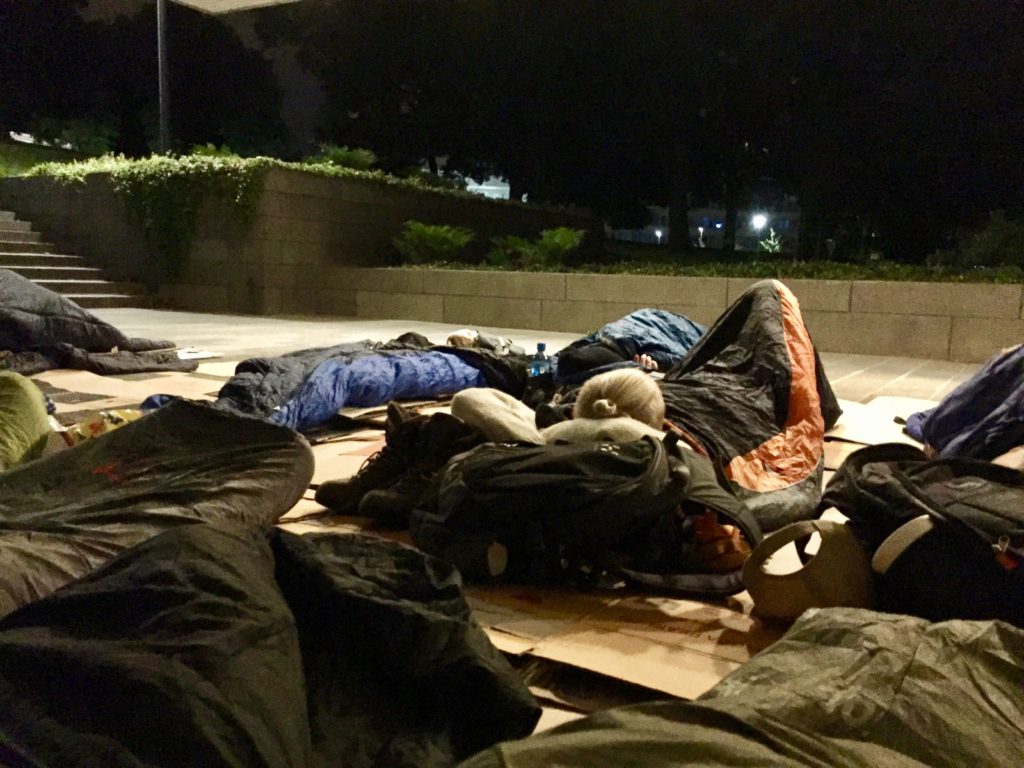
At our evening council circle I was so happy. We had managed to beg for our food and we had found cardboard. My assumptions were all proven wrong. I was elevated and not so afraid anymore. This was the most important lesson of Not-Knowing so far.
We slept very well next to the Helsinki City Theatre. We had a quiet place covered with a roof. In the morning we woke up and had our moment in silence and morning hymn and a prayer led by a Lutheran priest, Maika Vuori who was participating in our retreat.
Day Two
I had planned a few places to visit during our retreat. These were places to get a cup of coffee or something to eat. They were all places which were open to everyone, not just registered homeless folks of Helsinki. These places were the ones serving all people, including the paperless refugees. Along our way back to Kurvi we stopped at Vepa cafe, which is run by a local homeless organization.
They were so happy to see us. They gave us some coffee and tea and their staff member Faina Puustinen told us an amazing story that really shook us to the core. She had began serious drug use when she was only fourteen years old. She had spent twenty years totally immersed in substance abuse and living homeless. Then she had found a way to get into the rehab and stopped. She had now been clean for twenty years, serving the same people that she had been one of. At first she had seen many of her old friends, but they were all dead now.
We continued our way to Erityisdiakoniakeskus (Special Deaconess Center) to have breakfast. We were so happy to be there. A very nice place with wonderful volunteers serving people with love and dignity. Maija played the piano and it really felt like home.
This was an institute run by the state Lutheran church. They had all kinds of services for people with low income, refugees and homeless. They had a gym, showers, laundry room, breakfast cafe, a soup kitchen, and once a week they served waste food collected from the local supermarkets. They had also began to offer a temporary sleeping place for thirty individuals each night. Many of them were paperless refugees, who were not welcome at the other place run by the city’s social services. One of their deacons Kimmo Kajos introduced their services to us. In addition to his work at this place, he also did prison work.
Roshi Frank asked him what was the reason for him to do these things. Kimmo told us that one of the reasons was that he had seen a lot of kindness among the people he worked with, especially in prisons. That really struck us all. I had never thought that homeless and people in prison were especially kind people. I had been wrong. Kimmo was right. Another lesson of Not-Knowing.
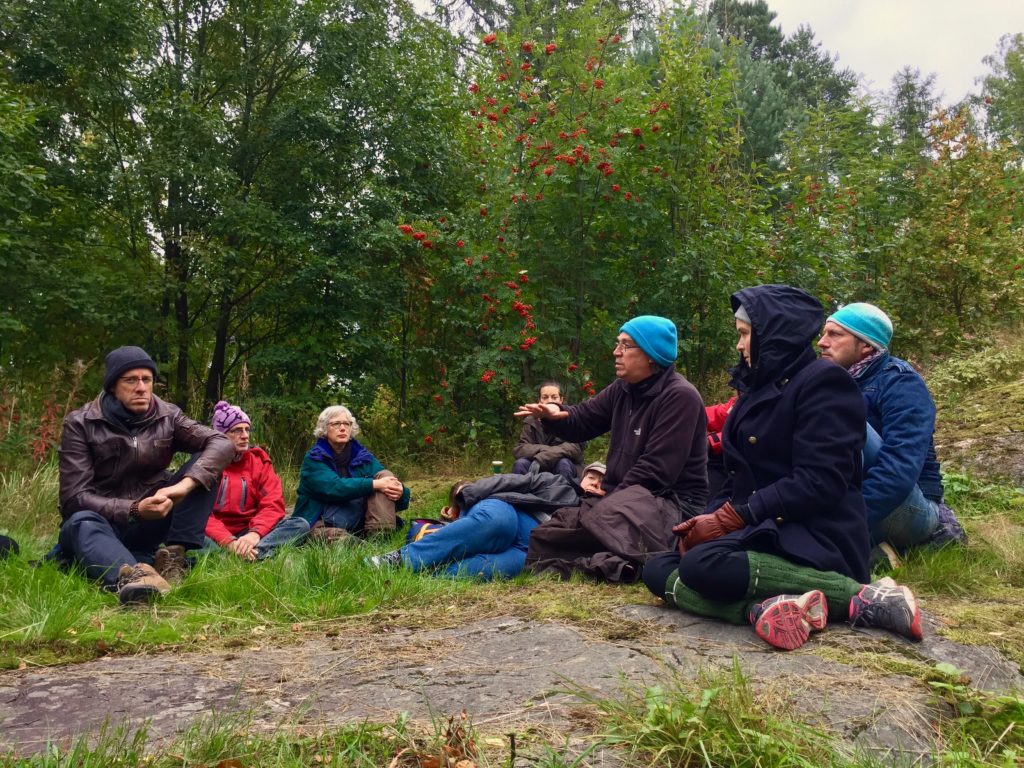
We were kind of close to a 1918 Civil War memorial for those killed on the “Red” side, so we decided to walk there to have a moment of reflection on how the civil war had affected my own family and possibly the family histories of some of our other Finnish participants. (The Finnish Civil War was fought between the “Reds,” a paramilitary group composed of industrial and agrarian workers, supported by Russian forces, and the “Whites,” a conservative Senate-led paramilitary group, composed of peasants and middle- and upper-class factions, supported by Imperial Germany.) I got very emotional as I talked about the tragic and violent events of the Civil War and during the decades that followed. It is a big sore in the Finnish psyche. We left after offering a beautiful ceremony for all the hungry ghosts left here, during and after the civil war one hundred years ago.
It began to rain as we meandered aimlessly back to the more familiar neighborhoods. We stopped at the free panorama ride at the local amusement park called Linnanmäki. That lifted us up in the air and we could all see this beautiful city opening in front of us. The city itself was becoming a part of the retreat.
It began raining harder. We were really concerned what and where we should eat. And whether our cardboard was still dry at the place we had stored it. We still had plenty of money. We had begged in the morning, and we still had more than 60 euros. We passed another deaconess center and asked them if we could stay there for the night. They didn’t let us in, but I found out later that they had spoken about us the next day. They could’ve actually taken us in, but the caretaker just didn’t want to. However it was good to know that they actually sometimes take wandering strangers in.
Our group was getting hungry and the rain was really getting on our nerves. Some of us decided that maybe we should just go to restaurants and ask if they would offer us dinner with the money we had. Some of us, Roshi Frank included, thought it was a useless idea. But as we walked past the nicest vegetarian place of the whole area two of us went in and begged. We offered all the money we had begged if they would take our seventeen-member, smelly and soaking wet group in to let us eat. They thought about it for awhile and finally it worked. We were invited in and they let us eat as much as we wanted at their buffet, including desserts with coffee and tea. That was a lesson of how elevating and rewarding it really is, if we let go of all fixed ideas about everything.
We were all so happy after the dinner. We walked back to our cardboard and hauled it to the same nice location we had stayed the night before. We all fell asleep with big smiles on our faces. But we woke up only two hours later. We had bad news. The private security guards had decided to kick us out. They wanted to know if we had a permit from the theater to sleep on their grounds. Of course we didn’t. It was a public space.
I had already spoken with the chief of police about sleeping outside and we were not breaking any laws here either. They wanted to know if we were members of some association. We laughed later at another location, that maybe we should’ve told them that we were members of the “Full Moon Campers Society”. Maybe they would have recognized this fictional association and told us: “Why didn’t you say so? We love those guys! Those guys are awesome!” I can still see Roshi Frank laughing in his sleeping bag as the huge full moon was protecting us with its warm glow.
In the morning we walked past another civil war memorial place. It is a site of one of the last battles between the Reds and the Whites. It’s a bridge called Pitkäsilta that still separates the working class neighborhoods from the more rich southern areas of Helsinki. We went to the Central Railway Station to beg for money to get breakfast. Begging was very difficult. I only had some small change and a series of nasty remarks. It felt terrible.
Luckily we had enough for the optional donation at the breakfast place at the Annankulma, which is a kind of “living room” organized by the lutheran church. It felt so nice to get there. They were so happy to see us. They sang a hymn first. My wife Maija offered to play the piano and everyone loved it. They wanted me to say a few words of our practice. One of the retired old ladies thought that it’s a disgrace to beg. According to her, there should be no begging in Finland. We had a great welfare system and no one should have the need to beg. She also told that the church should be a place of spirituality, not a place for socially challenged individuals.
The deaconess who had invited us for a visit, stood up and gave a great speech about the social responsibility of the Christian church. She told that the church is obligated to help the unfortunate. They should not ask any questions. They should be ready to serve everybody. The spiritual teaching comes after that. I was so struck by that. My overall sense of the role of the church has changed dramatically. There’s so much goodness and dignity in the work they’re doing. I got the sense that their spiritual practice was actually socially engaged work. They were serving the people and becoming the Christ in this process. This was another lesson of Not-Knowing. I had no idea that their practice is so close to ours. Our reason for socially engaged work is to experience the oneness of life.
During that day we saw many things. We had an improvised service at the monument dedicated for the eight Jews who were deported to Estonia during WW2 and ultimately exterminated by the Germans. We performed another service at the monument that was dedicated to a group of 123 German soldiers who had fought at the Finnish civil war but sank on a boat on their way back home. And we held a Gate of Sweet Nectar ceremony at the German mass grave for the victims of the Civil War. After the ceremony we held at the Red Guards’ monument the day before, it felt extremely touching also to recognize the opposing side of the conflict.
We still had to beg. And we were going to Kamppi, which is one of the most hectic places in town. We sat for awhile at an ecumenical open chapel which is a contemporary building with wooden rounded walls and high ceilings. It was a perfect place for our moment in silence. A moment of silence just before going begging in one of the craziest places around.
Roshi Frank said later that it was one of the most Samsaric places he had ever been to. It is a huge square with people running from place to place. There’s people shooting heroin, prostitution, Romanian beggars, kids drinking, businessmen in fancy suits, shoppers with their bags and headphones. And our group was there too. We were asking for money, it was so difficult. I only got a few coins, but managed to beg for food from restaurants. I even got some chocolates and a nice hot cup of tea.
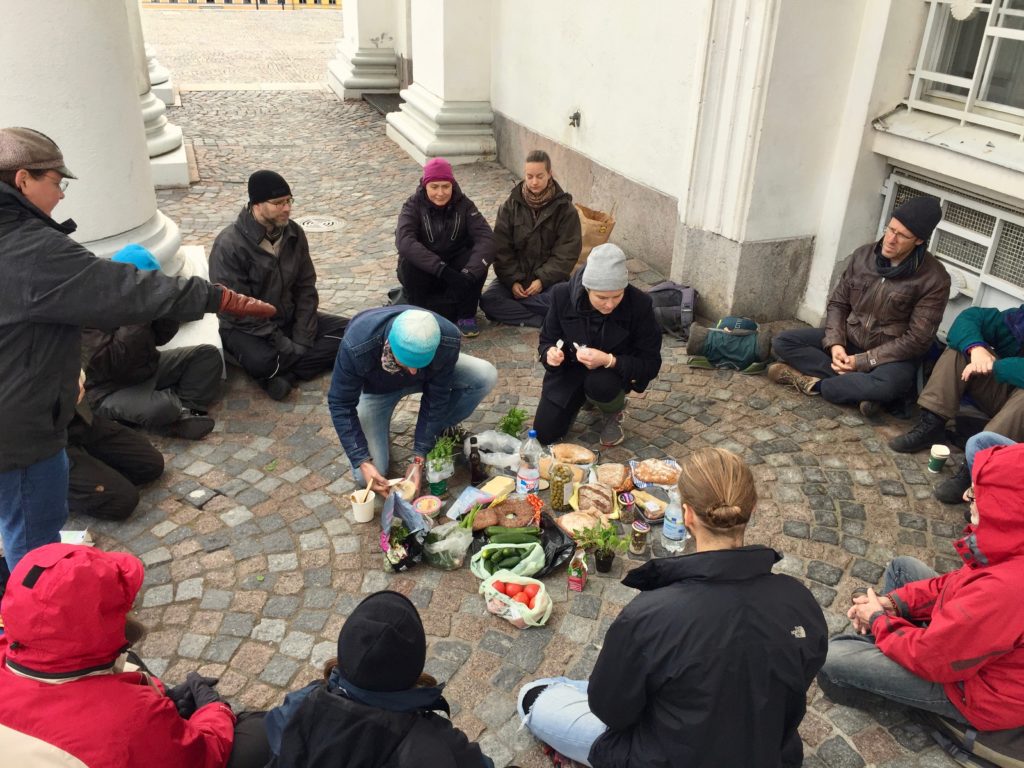
One Nepalese restaurant was very happy to give us food for the evening. That really felt nice. But all of us agreed, it was a terrible place. It feels like the whole experience boils down to Maija’s experience. She was asking for small change and the answer was “Haista vittu!” (fuck you!) One participant from Ireland told us that it actually sounds like “nice to meet you”.
We still had a long walk to the escape the busy center of the town. We were weighing our options where to sleep. It was going to rain very heavily on our last night. We also had to find a place indoors for the Jukai on our last day. Suddenly we were invited to sleep at a local theater. Maika who was our master beggar had managed to beg for two bottles of red wine for our last dinner. We all slept very poorly indoors on a hard concrete floor, but the dinner we had begged for was perfect.
Closing
The next morning it was still raining very hard. We walked to a place that served free hot oatmeal and very cheap coffee. They were also happy to have us as their guests. We were happy to be indoors but we had to get moving quickly for our closing circle.
The Peacemaker Jukai was held at the same theater where we spent our last night. Roshi Frank set up the place very nicely. The whole group of retreat participants were sitting there in a circle, with my son and some family members and friends as Maija walked me in. It was a very moving experience to sit inside that circle and feel the energy of all those amazing people who had come to this retreat.
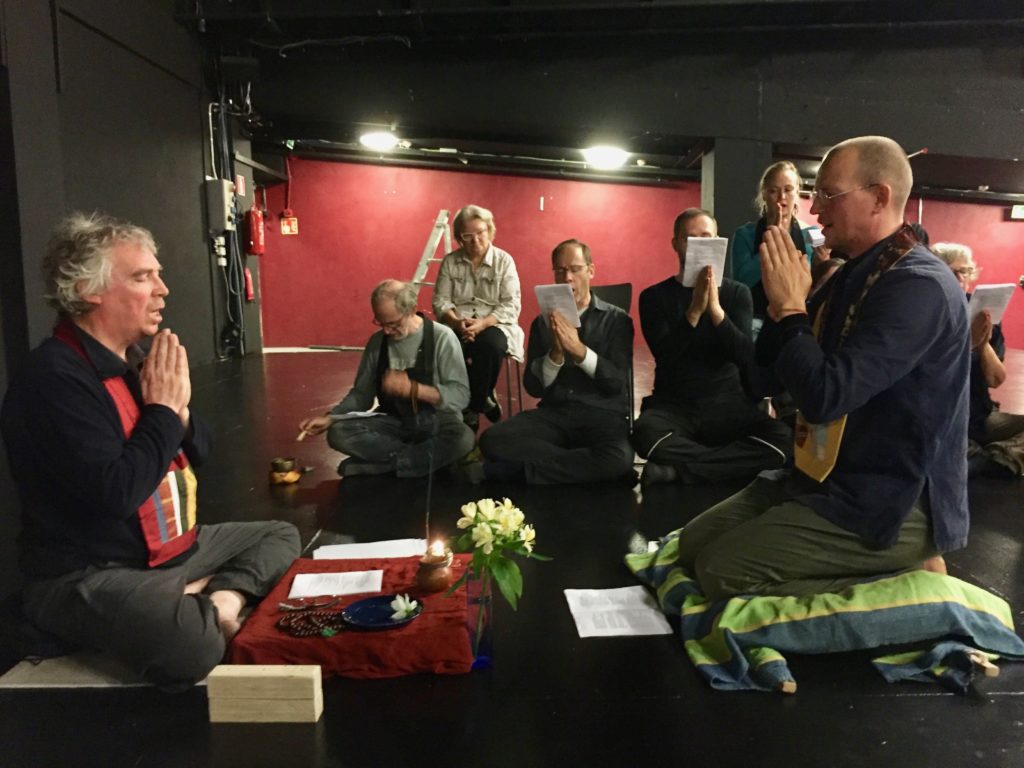
At some point I just felt this awesome gratitude of being in that moment and with those people. I began to cry tears of joy and happiness. At that moment of joyous tears Roshi Frank handed me my Rakusu and my dharma name which was Joyous Faith – Peacemaker, Rakushin Angyo. The way Roshi Frank described me was the way I see all people. I see them with joy and the belief that they all have the ability to shine and love.
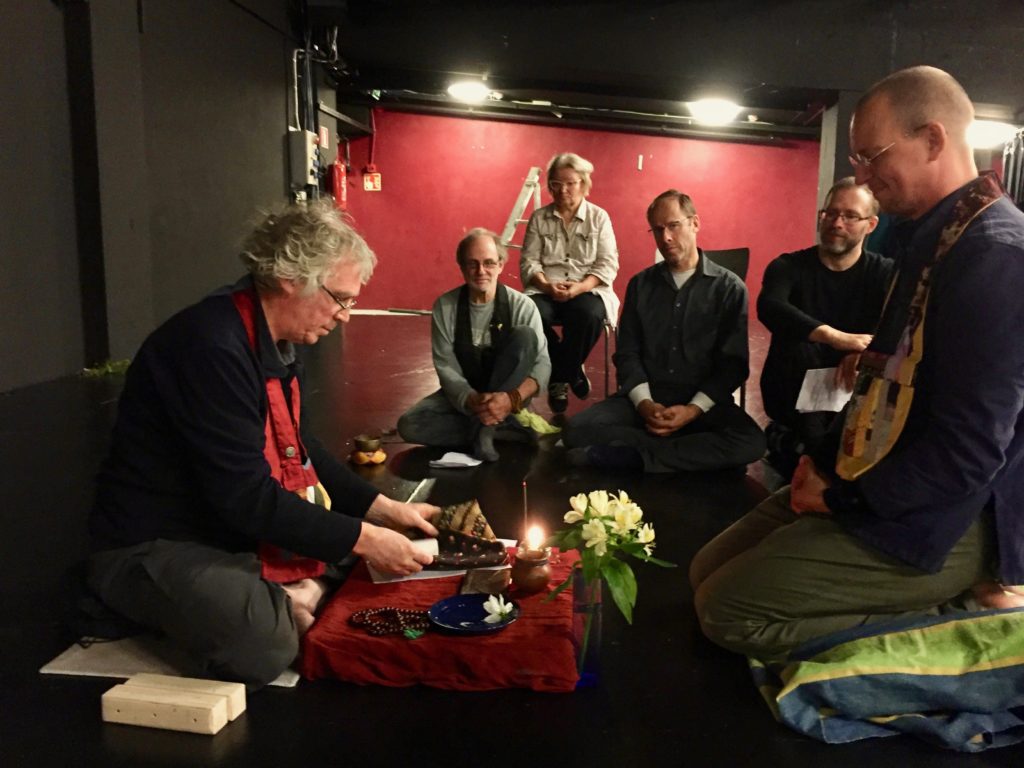
I had thought that the ending lunch at a local pizza place would’ve been the most luxurious thing ever, after all we had experienced. But it wasn’t. We had been so overwhelmed with the abundance the streets had always offered us. We were never without anything. We always had food and friendship.
Asking for money from strangers was the hardest thing for me. I barely got anything. But I wasn’t alone so it didn’t matter as some others got much more than we needed. Having the trust in the group and in the people we were interacting with was one of the most important experiences. I have always been working alone. I have trusted only in myself. As the retreat went on, I feel I became more open and accepting. I felt tremendous love towards everyone, not just our group, for everyone. I sense that the true power of humanity comes from collaboration and interdependence. Now I feel that the only way I can continue my work is to connect with other people. And that is what we have done.
We already have a group of people who feel committed to volunteering for homeless projects and prisons, and we have been told that some other groups are finding ways to make offerings for the places that had offered their services to us. Some participants have also decided to join the Zen Peacemakers! We are slowly building up a new sangha here in Finland.
Delivering our Mala-donations was a very moving experience too. So many people had been seriously worried about us and had felt tremendous respect towards our practice. Many of them told us that the politicians should do what we’re doing to have some sort of sense of what is it like to live on the streets. Even for a few nights. They told us that from their perspective, it would change everything. It had worked for us. They also wanted us to speak out. To become the voice for them, as nobody wasn’t really paying attention to their needs. With humble respect I will do my best.
With love and respect,
Rakushin
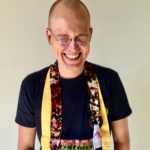 Mikko Rakushin Ijäs, PhD is a Finnish media artist and an Associate researcher at the department of Human Evolutionary Biology of Harvard University. Mikko’s doctoral dissertation “Fragments of the Hunt” dealt with the birth of art among the early hunter-gatherer societies. He has also produced a documentary film together with his wife Maija Ijäs on the same subject. (Photo by Mikko Ijäs, in Helsinki)
Mikko Rakushin Ijäs, PhD is a Finnish media artist and an Associate researcher at the department of Human Evolutionary Biology of Harvard University. Mikko’s doctoral dissertation “Fragments of the Hunt” dealt with the birth of art among the early hunter-gatherer societies. He has also produced a documentary film together with his wife Maija Ijäs on the same subject. (Photo by Mikko Ijäs, in Helsinki)

